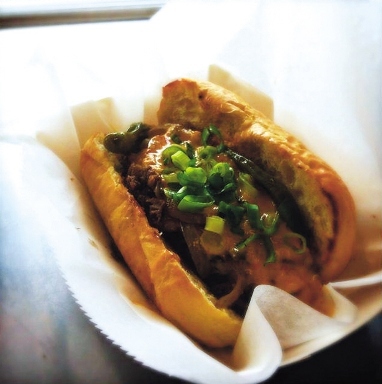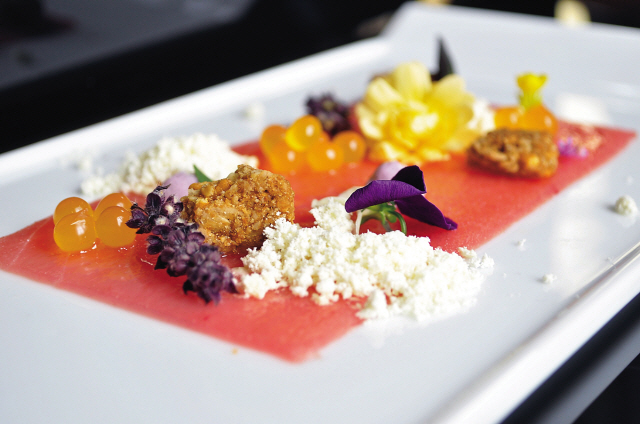A new generation of Korean chefs, whether they are Korean-Americans or Korean migrants, are introducing Korean flavors to the U.S. and captivating the American palate.
From neighborhood taco trucks catering to those looking for a quick bite to high-end dining spots adorned with a Michelin star, the chefs are armed with the cultural understanding and intimate knowledge of both countries’ ingredients ― skills necessary for putting Korean food on the international gastronomical map.
Familiarizing
Korean-American Laura Lee opened her own food truck, Ajumama (a compound of “ajumma” meaning married woman and “mama” meaning your highness), in Columbus, Ohio, last year and received rave reviews immediately.
Lee announces her routes via Twitter and Facebook, and people follow her wherever she goes.
Her hotteok, bulgogi cheesesteak and ttuk ‘n’ cheese are street foods she learned to make in Korea, fused with American comfort foods.
“We are lucky to be based in Columbus, which has a large foreign student population because of Ohio State University. There is a very active independent food scene that embraces the less mainstream food cultures and is supportive of local business,” Lee said.
From neighborhood taco trucks catering to those looking for a quick bite to high-end dining spots adorned with a Michelin star, the chefs are armed with the cultural understanding and intimate knowledge of both countries’ ingredients ― skills necessary for putting Korean food on the international gastronomical map.
Familiarizing
Korean-American Laura Lee opened her own food truck, Ajumama (a compound of “ajumma” meaning married woman and “mama” meaning your highness), in Columbus, Ohio, last year and received rave reviews immediately.
Lee announces her routes via Twitter and Facebook, and people follow her wherever she goes.
Her hotteok, bulgogi cheesesteak and ttuk ‘n’ cheese are street foods she learned to make in Korea, fused with American comfort foods.
“We are lucky to be based in Columbus, which has a large foreign student population because of Ohio State University. There is a very active independent food scene that embraces the less mainstream food cultures and is supportive of local business,” Lee said.

Perhaps Lee’s “start small, get big” strategy owes something to Roy Choi, who was named one of the top rookie chefs of 2010 by noted culinary magazine Food and Wine.
Inspired by the convenient wrapping method of the Mexican taco, Choi adapted the wrap to give it a bulgogi (sweetly marinated beef) and kimchi filling and sold it from a food truck in L.A. starting in 2008. His venture, Kogi Korean BBQ, became a huge success.
“Yes, tteokbokki (rice cakes broiled in spicy sauce) and bibimbap are good. But if it is not related to the everyday lives of Americans, they won’t really reach out that far. We should really take Americans into consideration,” Choi once said at a seminar.
Going upscale
Miss Korea BBQ, GAONNURI and Barn Joo, all famous restaurants in New York City, turned familiar food into proper cuisine.
Andy Sung of GAONNURI introduced modum jun, a Korean pancake sampler with kimchi, fish, beef and vegetable versions, which is served as both comfort food and a form of tapas. But the dish doesn’t come cheap ― modum jun costs around $26.
“There are lots of dishes that still need to be made properly at high quality at Korean restaurants,” he said.
Sophia Lee, founder of Miss Korea BBQ, said her clay pot galbi and bibimbap are popular with non-Koreans, who account for 70 percent of her clients.
“I want to remaster all Korean cuisines in the market and refine them into an upscale course,” she said.
High-end, global
Jungsik, run by Yim Jung-sik in the Big Apple, recently won a Michelin star. With course menus priced north of $155, Yoo says Korean cuisine, despite low awareness, could become a gourmand’s indulgence.
“Many media outlets have said the gastronomical keyword for 2013 is ‘Korean.’ I think we have a good future,” he said.

Korean dishes do not necessarily have to be authentic or even look Korean. Akira Back, born as Back Sung-ook, rose to fame in the U.S. after appearing on the cooking show “Iron Chef America.” As his name suggests, he presents fusion Japanese dishes with a Korean touch at his Las Vegas diner Yellowtail, and attracts hundreds of thousands of people a year.
“I find it a merit, being able to fuse Korean ingredients, food and techniques into American cuisine. Because the U.S. is already a big melting pot, people embrace different things easily,” Back said.
The chefs say Korean cuisine has a bright future. “Yes, Psy and Ryu Hyun-jin as well as Korean companies have raised Korea’s national brand as well as awareness. And interest for Korean cuisine is increasing in that aspect,” Back said.
“When more Koreans come here, make global headlines and open globally famous restaurants, things might get better.”
By Bae Ji-sook (baejisook@heraldcorp.com)
-
Articles by Korea Herald


![[AtoZ into Korean mind] Humor in Korea: Navigating the line between what's funny and not](http://res.heraldm.com/phpwas/restmb_idxmake.php?idx=644&simg=/content/image/2024/04/22/20240422050642_0.jpg&u=)


![[Herald Interview] Why Toss invited hackers to penetrate its system](http://res.heraldm.com/phpwas/restmb_idxmake.php?idx=644&simg=/content/image/2024/04/22/20240422050569_0.jpg&u=20240422150649)
![[Graphic News] 77% of young Koreans still financially dependent](http://res.heraldm.com/phpwas/restmb_idxmake.php?idx=644&simg=/content/image/2024/04/22/20240422050762_0.gif&u=)
![[Exclusive] Korean military set to ban iPhones over 'security' concerns](http://res.heraldm.com/phpwas/restmb_idxmake.php?idx=644&simg=/content/image/2024/04/23/20240423050599_0.jpg&u=20240423183955)







![[Exclusive] Korean military to ban iPhones over security issues](http://res.heraldm.com/phpwas/restmb_idxmake.php?idx=652&simg=/content/image/2024/04/23/20240423050599_0.jpg&u=20240423183955)



![[Today’s K-pop] Ateez confirms US tour details](http://res.heraldm.com/phpwas/restmb_idxmake.php?idx=642&simg=/content/image/2024/04/23/20240423050700_0.jpg&u=)